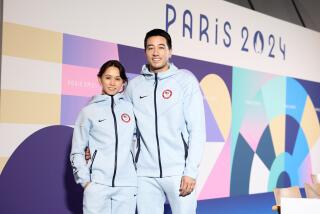Siblings Provide the Spice on Ice
- Share via
ALBERTVILLE, France — He’s from France, she’s from Canada, they are brother and sister. They train in Germany, their choreographer is from England and their coach is a Czech who prefers to be called a Slovakian.
Their act at the ’88 Winter Olympics was done to African music in wild-animal skins ripped to shreds. It was wildly popular with the audience, but widely ripped by the judges.
No wonder nobody knows where they’re coming from.
In four years’ time, Paul and Isabelle Duchesnay have become both the hottest and coolest couple on ice.
Are they known around the world?
Far and wide. The ice-dancing Duchesnays (Doo-sha-nays) made the cover of the European edition of Time magazine.
Will they be known in America?
“I don’t know,” Paul says. “In America, they know Bo, but I don’t think they know us.”
Maybe after Americans get a television eyeful of the Duchesnays here Friday night, that will change. Anyone partial to Bo Jackson or ballplaying types might never be budged. But those who know and go to ice shows might be lining up at Ticketron outlets for the Duchesnays, who represent France but have built up a following across the Continent as well as in Canada.
They might be the most spellbinding ice-dancers since Jayne Torvill and Christopher Dean of Great Britain rattled off an unprecedented nine-of-nine perfect scores for artistic impression at the 1984 Games.
While they are hardly a gold-medal lock the way Torvill and Dean were--in fact, they have a heated rivalry going with two Russians who were Calgary’s silver medalists--the Duchesnays have become France’s darlings thanks to the exotic choreography of Dean, who also happens to be married to Isabelle Duchesnay.
Some see Paul and Isabelle as incredibly innovative. While they avoid the romantic approach--a wise idea, being siblings--that worked so well for Torvill and Dean, who skated to Ravel’s “Bolero,” the Duchesnays have weaved dramatic and even political themes into their routines. Their act also is built for speed more than comfort.
But innovative is not the word that Sergei Ponomarenko and Marina Klimova use. Plagiarists is their word. The Russian ice dancers think of the Duchesnays as totally derivative, Dean-designed marionettes who simply go where he tells them.
“I am persuaded that Dean could do the same thing with any other couple,” scoffs Ponomarenko, who with his partner won the recent European championships, after the Duchesnays withdrew because of an injury to Paul.
Declining to get into a war of words, Isabelle Duchesnay said here Wednesday: “Paul and I don’t copy anyone. And we’re not in the habit of criticizing others.”
She and her brother understand criticism. They heard plenty at Calgary after their “Mango” routine. Judges were so appalled, the Duchesnays ended up in eighth place.
Purists in the sport already believed Torvill and Dean had pushed the boundaries of taste with their passionate dance. The judges felt skaters were going too far.
What they overlooked was the crowd-pleasing effect. Audiences wanted something new, something daring. And, as it turned out, the sport’s judges ended up bending more than the skaters did, tolerating, if not encouraging, radical ideas.
That’s why the Duchesnays caught up to, even surpassed, Ponomarenko and Klimova, who understandably resented it. From eighth at the Olympics, Paul and Isabelle rose to be 1991 world champions.
And, in the process, acquired a cult following.
“It adds a lot of pressure,” Paul says of being France’s gold-medal favorites, “but having people cheering sure gives you a lift. Look at hockey. You’re still five against five, no matter where you play, but you usually skate harder for a cheering audience than for four blank walls.”
Hockey references come naturally to the Duchesnays, who grew up in Quebec. But when their career there sputtered, they left Canada for the land of Paul’s birth. And although they skate for France, they are coached by Martin Skotnicky, who is from Czechoslovakia but runs a school in Germany.
Thinking of a day at the Montreal airport recently, Paul said: “I was trying to work out what I am. I saw Quebeckers there and said: ‘That’s what I am--almost.’ Then I saw some Frenchmen and said: ‘That’s what I am--almost.’ We spent too long in Quebec to turn our backs on it.”
Said Isabelle: “Let’s hope we’ve had the best of both worlds.”
They intend to take their act to the world soon, for one year only. No more Olympics, one year of ice shows. How much anyone will want to see them depends on what happens here Friday.
More to Read
Go beyond the scoreboard
Get the latest on L.A.'s teams in the daily Sports Report newsletter.
You may occasionally receive promotional content from the Los Angeles Times.






